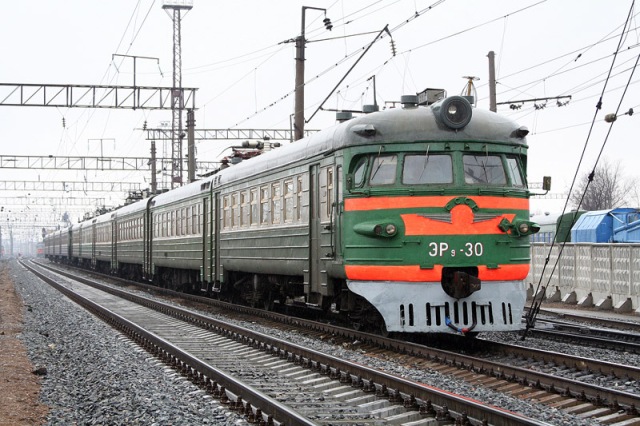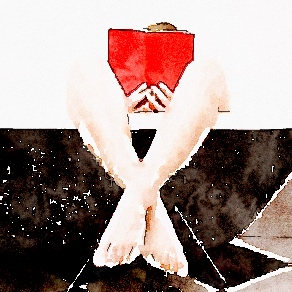Moscow Stations by Venedikt Yerofeev is one of those quirky… no, strike that… one of those weird, modern books that I’m not supposed to like. And, generally, I don’t like them. But every now and then something modern comes along – in my vocabulary that would be anything written after World War II although my detractors will cry ‘after the 19th century’ – which works for me. There was, for example, Tom Stoppard’s play, Rosencrantz and Guildenstern Are Dead. That has been a long time ago, but more recently there was Death in the Andes by Mario Vargas Llosa, and now, Moscow Stations.
I read Moscow Stations on the recommendation of my husband. That in itself was weird already because, as a rule, I never read books on my husband’s recommendation. (Nor he on mine. It’s been established quite early in our relationship that such literary crossovers, generally, were a total waste of time.) But there must have been a good reason once for us to get married – well, we did agree that Rosencrantz and Guildenstern were hilarious – because currently he’s reading a book on my recommendation… and I’ve just read two in the space of one week on his.
Everybody says: the Kremlin, the Kremlin. They all go on about it, but I’ve never seen it. The number of times (thousands) I’ve been drunk or hung over, traipsing round Moscow, north-south, east-west, end to end, straight through or any old way – and I’ve never once seen the Kremlin.
Yerofeev wrote Moscow Stations in 1969, and I cannot say I’m surprised that it could only be circulated in the form of samizdat. In the great Soviet Union, naturally, there were no drunkards but all workers were full of righteous workmanly zeal, ticket inspectors never waived fines in exchange for vodka and every Muscovite saw the Kremlin… Sod the Kremlin, of course they spent every Sunday queuing to see Lenin’s mummy right under the famous red walls.
For instance, yesterday – yesterday I didn’t see it again, though I was buzzing around that area the whole evening and it’s not as if I was particularly drunk. I mean, as soon as I came out onto Savyelov Station, I had a glass of Zubrovka for starters, since I know from experience that as an early morning tipple, nobody’s so far dreamed up anything better.
I remember this great Soviet Union, actually, although not from 1969 but 1978. I was only a kid but it did make an unforgettable impression. My father spent a year studying in Russia in a small town by the name of Solnechnogorsk. Some seventy kilometres on the elektrichka, the green suburban train with wooden benches, from Moscow. The crowded and smelly electric train I imagine Yerofeev was riding in this novel to Petushki. And back.

Solnechnogorsk – no offence meant to local residents – was a dump in the great Russian nowhere in 1978, despite its proximity to Moscow. Soulless modern blocks of flats, wide roads empty of traffic, hardly any shops and absolutely eff-all to buy in the shops. There was a fishmonger, I remember, that stank to the end of the next street. In the local supermarket, if you could term it as such, the shelves were mostly empty. There were a couple of bags of flour on one shelf, the flour spilling from a hole chewed in the paper bag, and mice were running on that shelf in broad daylight. A single chicken, dangling from a hook, and that chicken…! It was scrawny, purple and as unappetising as you’ve ever seen a chicken to be. My mother and I went into that shop to buy some food so that she could cook a nice home-made dinner for my father… but she left that chicken, that’s all I say. We ended up eating the tinned food we brought from Hungary that was meant to sustain him for the rest of his stay. To think that when we packed the tins we thought he had simply asked for them because he missed the home flavours!
Well, that was Solnechnogorsk – and probably everywhere else – in 1978.
There were other bits of Soviet Russia that I recall vividly. The queue winding round and round Red Square under the walls of the Kremlin as people waited to be able to shuffle past Lenin’s glass coffin. The magnificent Moscow metro stations with marble floors, chandeliers and paintings on the wall. Like palaces, they seemed to me, not metro stations. I didn’t know then that they were built by slave labour – or so I have heard since. (Maybe it’s just slander. But even if it’s slander, it’s believable slander.) The Red Arrow express to St Petersburg – Leningrad as it then was.

It took my father weeks of petitioning to be allowed to travel with his family to Leningrad. And he was an army officer on Soviet military (& the associated ideological) training from a satellite country and a communist party member to boot. In the end, we were allowed to travel. With an escort. A lieutenant and two privates followed us at the distance of a couple of steps everywhere. Yes, that’s everywhere. They stood guard by the carriage compartment while we slept. They accompanied my mother and me to the very door of the ladies. They waited for us to emerge from the hotel room in the morning and escorted us downstairs for breakfast. They walked behind us on Nevsky prospekt and they visited the Hermitage with us. My mother was embarrassed at such level of attention. I was merely curious, and kept looking back to see if they were still there. My father tried to be nice, offering them a cigarette and inviting them for a glass of vodka. They didn’t accept. I have no complaints against the three – they were polite and as unobtrusive as anyone could be when following somebody else two steps behind. After all, my father was a fellow soldier. They probably thought they could have pulled much worse duty than accompanying a family of tourists all over Leningrad for three days.

The plot of Yerofeev’s novel can be summed up as the train trip of a drunken bloke from Moscow to Petushki. He’s on his way to see his girlfriend and his son, taking presents. He starts out hungover from the night before and he drinks throughout the trip. I could go into details but don’t you hate spoilers?
The plot – as I said – could be summed up as above. But in fact nothing could be further from the reality of the novel than the description above. This is a book about life in the glorious Soviet Union, and boy, is that life s**t. No wonder the characters are all in a permanent state of drunkenness. Even less wonder that the book – subversive doesn’t begin to describe it – was not published till 1989. Although it’s also possible that the censors simply didn’t go in for black humour. There’s that about censorship, you know. The censors might not share your sense of humour.
…the last straw, as far as the university was concerned, was an incident during compulsory military training, when the Major in charge of the class informed the students, standing half-heartedly to attention, that the most important thing a man could possess was a straight back. Yerofeev couldn’t resist it. “Those were Hermann Goering’s words,” he pointed out, “and they hanged him in 1946!”
(Stephen Mulrine: Foreword to Moscow Stations re. Yerofeev’s expulsion from university)


Struck by your humble admission that you are nervous where feedback is concerned, I couldn’t pass you by 🙂 And, I am so pleased that I followed my instincts (I most often do 🙂 )…your writing is brilliant….so rich in detail…so dynamic and engaging…it ignites the senses….what a privilege to read…thank you for sharing your gift for communication and connection!
LikeLiked by 1 person
Thank you… I’m glad you liked it. Although I feel more nervous than ever after such a praise!
LikeLike
That is the exact opposite of my intention 🙂 I meant to encourage you…it is an honour to do so…I meant every word….keep going!!!! 🙂
LikeLike
I very much enjoyed this blog, and in fact I think I will track down the novel and read it.
LikeLiked by 1 person
It’s certainly worth reading, I enjoyed it very much! I’m sure you should be able to get the book in an online bookshop.
LikeLike
there are some copies listed on Amazon, $10+ I’ going to check HalfPriceBooks.
LikeLiked by 1 person
Wish you luck in your search!
LikeLike